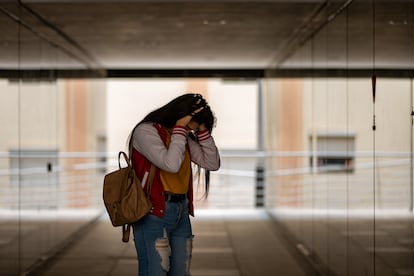How to deal with the fact that your teenager wants to leave school
Listening to their reasons, taking them seriously and coordinating with the school are key to handling the situation


“I want to leave school.” Carolina Benedet, 49, first heard this fateful phrase from her son Alejo, 17, two years ago. It was a huge blow for her. “After giving it some thought and trying to find the source of the issue, I realized that the problem had actually started earlier,” she says. “In secondary school there were quite a few bad students in his class, with whom he didn’t get along well.” The worst came after the Covid-19 pandemic: “After almost two years with most classes being done remotely, he lagged far behind and longed to be part of a group.” That is when the poor academic level combined with the lack of study habit — lost during the lockdown ― and took a toll on the boy. “He started getting very bad grades, especially in mathematics and physics. That was too much for him, and he began to feel like the class fool. That’s when he started to consider dropping out of school.”
Benedet’s account matches the opinion of pedagogue Ana Couto, creator of Estudiar con sentido (in English: Studying with meaning), a comprehensive student help program based on the idea that there are no bad students, only people who do not know how to study. “The reasons why they want to leave school are usually discouragement, lack of motivation, expectations and interest, low self-esteem, bad examples in their environment (family or friends),” Couto explains. “The causes may vary, but these young people have something in common: they are not doing well. Those who get A’s rarely want to quit.” According to Couto, they usually bring up this possibility when they are between 14 and 18 years old; in other words, in adolescence. “It is a time of rebellion in which they need to oppose the family, the system. If this moment happens to be more intense for them, they want to turn their back on everything, and school is no exception.”
“One of the last aspects to mature during adolescence is the ability to delay the feeling of reward for your actions, that is, doing something now without expecting an immediate reward,” explains David Bueno in his book El cerebro adolescente (in English: The teenage brain). This is why, says Ana Cobos, counselor and president of the Confederation of Psychopedagogy and Guidance Organizations of Spain (COPOE), they often see studying as a very long-term investment that they are not willing to make. “Even more so in a world in which values are leaning more and more towards immediacy and short-termism.”
How to react
Couto explains that, despite the initial vexation, it is important for parents to face the request to leave school calmly and without panicking. “You have to take them seriously and not go overboard. Confirm if their mind is made up or if they’re only contemplating the possibility. Listen to their reasons. For that we must ask, not with the intention of questioning them, but of understanding them,” she says. “And if we see that we’re getting very angry and cannot talk calmly, it’s better to leave the conversation for another time.”

But academic education, even more so during adolescence, is not just a matter for parents and students. “We must go to the schools, coordinate with the tutors, with the counselors, with the teachers, so that the children sense that there is a common effort, that the goal of families and educational centers is to help them succeed,” says Cobos. In fact, that good relationship is what sometimes makes a difference: “The family has to trust the educational system, something that occurs less in socioeconomically disadvantaged contexts, precisely those where dropout rates are higher.”
Benedet has seen for herself that the involvement of the school is essential. “This year, my son is repeating [the 10th grade] for the second time. Almost from the beginning, it seemed to me that being a repeater had condemned him to the contempt of some teachers, even though the boy was trying much harder than in previous years,” she says. “That is why, even though he asked me not to, I went to talk to the principal.” Since then, Benedet has the feeling that the way her son is being treated has improved a lot, “and this is proving to be very motivating for him. I think we have reached a very beneficial change of mindset; he no longer doubts that he can pass the grade.”
Exploring other options
In any case, if the decision is made and there is no turning back, they should not be forced to continue studying at any cost. “There is nothing wrong with exploring other options. We must have a broader outlook in the medium term, listen to what their life plan is, ask them what they want to do and how they plan to do it,” says Couto. She believes that they must be actively involved in their own education and in the decisions that are made. “There is a foundation of motivation that must exist in the family, which is support. We must guide and accompany them, whatever they decide.” And we should also keep in mind, adds Cobos, that people learn to be self-sufficient and independent when they are given the opportunity to be so.
On the other hand, Couto emphasizes that the fact that they drop out of school does not mean that they can never return: “It is not a one-way exit door. They can go back whenever they want, and they will do so with more desire and real motivation.”
Sign up for our weekly newsletter to get more English-language news coverage from EL PAÍS USA Edition
Tu suscripción se está usando en otro dispositivo
¿Quieres añadir otro usuario a tu suscripción?
Si continúas leyendo en este dispositivo, no se podrá leer en el otro.
FlechaTu suscripción se está usando en otro dispositivo y solo puedes acceder a EL PAÍS desde un dispositivo a la vez.
Si quieres compartir tu cuenta, cambia tu suscripción a la modalidad Premium, así podrás añadir otro usuario. Cada uno accederá con su propia cuenta de email, lo que os permitirá personalizar vuestra experiencia en EL PAÍS.
¿Tienes una suscripción de empresa? Accede aquí para contratar más cuentas.
En el caso de no saber quién está usando tu cuenta, te recomendamos cambiar tu contraseña aquí.
Si decides continuar compartiendo tu cuenta, este mensaje se mostrará en tu dispositivo y en el de la otra persona que está usando tu cuenta de forma indefinida, afectando a tu experiencia de lectura. Puedes consultar aquí los términos y condiciones de la suscripción digital.








































